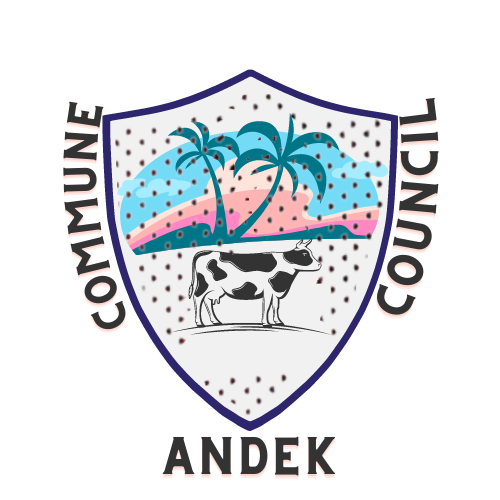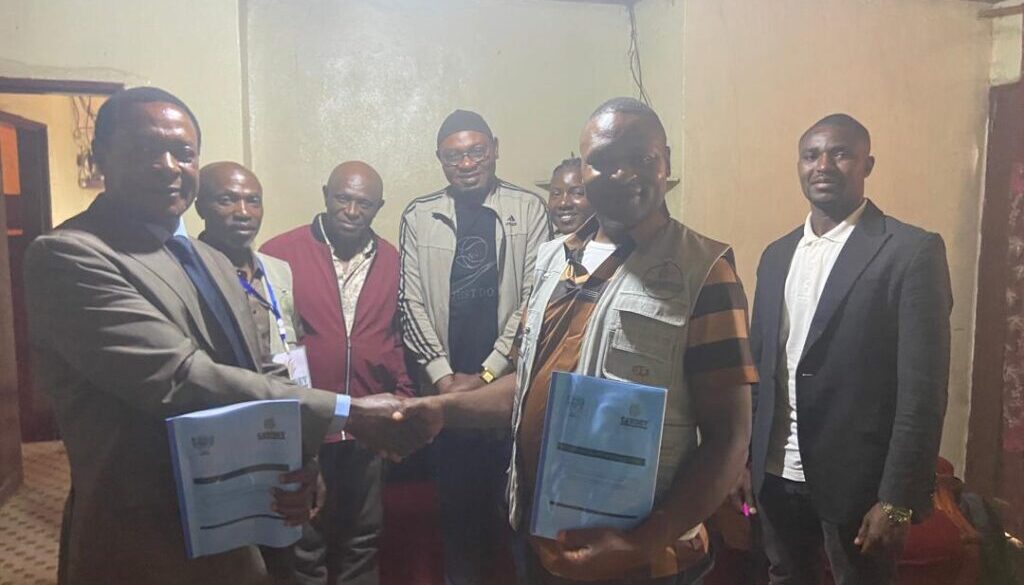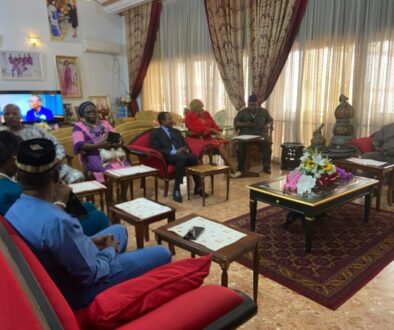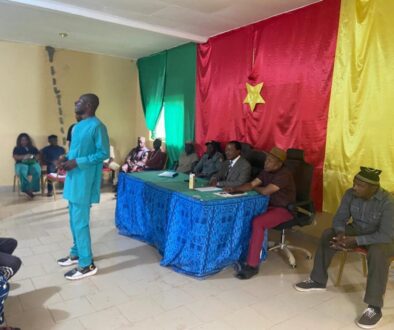SIGNING OF MEMORANDUM OF UNDERSTANDING( MOU) BETWEEN ANDEK COUNCIL AND CAMEROON WHEAT DEVELOPMENT COOPERATIVE SOCIETY(CAWDEV)
SIGNING OF MEMORANDUM OF UNDERSTANDING( MOU) BETWEEN ANDEK COUNCIL AND CAMEROON WHEAT DEVELOPMENT COOPERATIVE SOCIETY(CAWDEV) ON THE 06TH OF DECEMBER 20 AT THE ANDEK COUNCIL TOWN HALL.
A delegation of CAWDEV arrived ÀNDEK for the signing of this all important MOU.
The Lord Mayor of Andek council, Mr. Ubangoh Helly, in his welcome address hailed the delegation for breaking the challenging security situation to came for this important event.
The mayor stated that the collaboration is going to do much in the development of the income substitution policy of the state in the Andek municipality, in particular and Cameroon in general.
He also said that this MUO is going to assist the population of the municipality especially the youths to be self-employed and will earn sustainable income which will foster sustainable local development .
The Executive Director of CAWDEV, Mr Basilius Fonzenyuf Tatah, who lead the delegation took the floor and emphasis that more memorandums will came since this is just the beginning of collaboration and there are still more to be exploited in the agricultural sector in Cameroon.
He said the main objective of this first collaboration is to create a data base of farmers who are in or interested in the cultivation of any of the six crops which CAWDEV are into.
He also reiterated that the import substitution policy shall give the youth a wide range of opportunities to be exploited.
He thanked the mayor for the initiative and resilient collaboration and urged the council to sponsor the activity sustainably for their benefit and that of the population of the municipality.
The ceremony was attended by the top personalities of the council: The Municipal Treasurer, the Secretary General and the CDO who took turns to thank the mayor for his creativity and resilience.
They pledged their support to see that the initiative gets successful in the municipality.
The meeting then proceeded with the signing of the MOU of which the Lord Mayor of Andek council, Mr Urbangoh Helley Manyelle Alkoba, did that on the behalf of the Andek council and the executive president, Mr Basilius Fonzenyuf Tatah, did it on the behalf of CAWDEV.
The closing remark from the executive president came to a common interpretation that the MOU does not entails any financial obligation for both parties and hence will only serve as a document for collaboration.
The CDO.
PARTNERSHIP ENGAGEMENTS
CAWDEV is pushing forward to achieving its targeted 2million actors in her wheat value chain by 2027.
The elaboration strategy is built around participation of grassroots organizations, community development associations, traditional and municipal authorities to reach out to the most resilient grassroots smallholder farmers.
Key development stakeholders in the North West Region of Cameroon have fully embraced this CAWDEV holistic approach.
Potential Projects Emerging from the Partnership
1. Sustainable Crop Production Program
Objective: Boost the cultivation and yield of upland rice, wheat, and beans using improved seeds, fertilizers, and farming techniques.
Activities:
Introduce high-yield and drought-resistant crop varieties.
Provide training on modern farming practices, including pest management and soil fertility improvement.
Set up demonstration farms to showcase best practices to local farmers.
2. Community-Led Agribusiness Development Initiative
Objective: Empower farmers to transition from subsistence to commercial agriculture.
Activities:
Establish farmer cooperatives to improve collective bargaining power.
Facilitate access to local and regional markets for surplus production.
Offer training on value addition, such as rice milling, bean packaging, and wheat flour production.
3. Resource Mobilization and Capacity Building Project
Objective: Secure funding for community-driven agricultural projects and enhance local capacities for implementation.
Activities:
Develop and submit joint grant proposals to donors and government programs.
Conduct training sessions on project management and financial accountability for grassroots organizations.
Create a community fund to support smallholder farmers’ access to inputs and resources.
4. Sustainable Land Management and Climate Adaptation Initiative
Objective: Promote environmentally friendly farming practices to ensure long-term agricultural productivity.
Activities:
Introduce conservation agriculture practices, including minimal tillage and crop rotation.
Train farmers on water-saving techniques, such as rainwater harvesting and drip irrigation.
Promote agroforestry systems to integrate tree planting with crop production.
5. Youth and Women in Agriculture Empowerment Program
Objective: Involve youth and women in agriculture as key drivers of rural development.
Activities:
Provide targeted training and start-up resources for women and youth-led farming initiatives.
Establish mentorship programs pairing experienced farmers with young aspirants.
Develop a microcredit scheme to support women and youth entrepreneurs in agribusiness.
6. Food Security Monitoring and Early Warning System
Objective: Monitor agricultural production trends and provide timely warnings to mitigate food insecurity.
Activities:
Develop a community-based data collection system for crop yields and weather patterns.
Train local stakeholders to analyze data and implement proactive measures during crises.
Partner with regional agencies for timely dissemination of food security alerts.
7. Post-Harvest Handling and Storage Improvement Project
Objective: Reduce post-harvest losses to maximize the value of crop production.
Activities:
Construct community storage facilities equipped with modern preservation technology.
Train farmers on proper drying, packaging, and storage techniques.
Promote group marketing strategies to reduce spoilage and improve profitability.
8. Integrated Nutrition and Food Utilization Project
Objective: Enhance the nutritional impact of agricultural production on local communities.
Activities:
Develop community gardens to diversify diets with fruits and vegetables.
Conduct workshops on food preparation and processing for improved nutrition.
Distribute educational materials on the health benefits of locally grown crops.
9. Digital Agriculture and Technology Adoption Project
Objective: Introduce innovative digital tools to improve agricultural efficiency and knowledge sharing.
Activities:
Create a mobile platform for sharing weather forecasts, market prices, and farming tips.
Train farmers on the use of GPS tools for precision farming.
Partner with tech companies to pilot drones or IoT solutions for field monitoring.
10. Social Infrastructure and Economic Development Program
Objective: Address infrastructure gaps to support agricultural and community development.
Activities:
Build rural roads to improve access to markets.
Develop irrigation systems to support year-round farming.
Establish community centers for training and resource sharing.
Above are some intervention areas we may conduct need assessment and develop projects.
It’s also necessary that CAWDEV and Council stakeholders meet, maybe through zoom or otherwise and digest Council’s interest in order to harmonize strategy and if necessary also seek others opinion. Just brainstorming.
Looking forward to your perception about this.
Basilius Tatah



